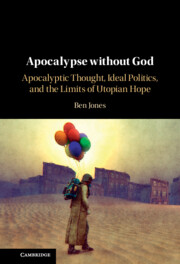'An important theme of several strands of political and theological reflection is that the line between religious thought and secular political thought is not bright. In many respects, secular political traditions draw heavily on religious ideas, often without realizing it. But by itself this thesis is familiar, glib, and often poorly defended. Apocalypse without God is anything but. The book is original, rich, and reflective. It carefully traces the idea of secular apocalyptic thought in important thinkers and ends with a critique of contemporary ideal theory along similar lines. Ben Jones not only reframes secular political theories from the past, but how much political philosophy operates today.'
Kevin Vallier - Bowling Green State University and author of Trust in a Polarized Age
'Visions of the ideal drive great plans and stoke great passions. But great plans rest on uncertain assumptions about the future, and great passions bring their own dangers. Ben Jones argues that embracing epistemic humility can temper the violent excesses of utopian hubris, and check ideal theory’s pretensions too. Yet this same epistemic humility makes space for utopian hope. A thoughtful, incisive, contemporary twist on a classic problem of enlightenment political thought.'
Nomi Claire Lazar - University of Ottawa and author of Out of Joint: Power, Crisis, and the Rhetoric of Time
'In this engaging book, Ben Jones revisits the long history of apocalyptic thought in order to explain its persistent appeal. Where some theorists separate religion and secular theory, Jones shows that religious traditions can enrich political reflection today. With lucidity and insight, he describes a circumspect hope that sustains the struggle for justice in an uncertain world.'
David Newheiser - Australian Catholic University and author of Hope in a Secular Age
‘… a convincing, concise, and source-based account of the apocalyptic hopes for a future Fifth Monarchy of Christ, which was to replace all other kingdoms.'
Matthias Riedl
Source: The Review of Politics





